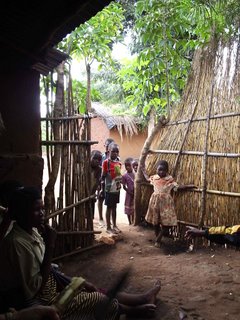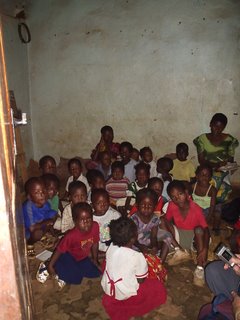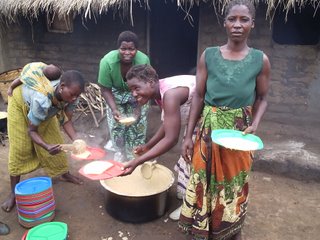slums and floods and famine
You know you are landing in Africa when you fly to Malawi. Looking out the
 window of the airplane, all you see for miles is endless expanses of red dirt roads and mud huts. The land looks lush and fertile despite the mass-media reports that Malawi is recovering from a famine. Stepping off the plane, you can spell the indescribable aroma of Africa in the air – a mix of manure, growing grass and salty sweat from the person ahead of you. Did I mention that deodorant is not a requirement in Africa? Be prepared if you ever come!
window of the airplane, all you see for miles is endless expanses of red dirt roads and mud huts. The land looks lush and fertile despite the mass-media reports that Malawi is recovering from a famine. Stepping off the plane, you can spell the indescribable aroma of Africa in the air – a mix of manure, growing grass and salty sweat from the person ahead of you. Did I mention that deodorant is not a requirement in Africa? Be prepared if you ever come!(these are some kids waiting outside of a patient's home we were visiting in the slums of Malawi)
If you have been following my blog closely, you may be wondering why in the world I am moving around so much. I have been to South Africa, Malawi, Mozambique and Zambia in the 5 months that I have been here. So I will explain myself…
There are hundreds of thousands of gorgeous, generous compassionate Africans who are working day and night to care for those who are dying of AIDS-related illnesses, and the orphaned young boys and girls who are left behind. Many of these people are not highly educated in the Western sense of the word, meaning that some of them have not even finished high school, and even fewer have comprehensive computer training. These people are instead wise in the ways of their communities – they often speak 3 to15 languages, they understand the traditional power structures, the stigmas that surround HIV/AIDS, and the traditional way to raise up these children. These individuals need financial support to do the work that they are doing. In turn, the international donor groups like the American government or the Canadian International Development Agency (CIDA) require extensive online reporting or long, written reports to document the validity and transparency of the programs. Which is entirely legitimate, because believe it or not, there are literally thousands of false organizations in Africa that receive money from these groups, and do nothing but put the money into their own pockets. Corruption is an ugly and ever-present reality in Africa.
Back to the reason I have been traveling – I am starting to work in what is called “capacity building”. Pretty basic – I have the privilege of training these super-fly people who are literally giving their lives to help people so that they can receive funding to do what they do. I assess the skills present amongst the staff members, speak to the director about which staff members he/she would like to receive training, and then we start. So far, I have been working in basic computer skills and database management, and a bit on proposal writing. It is actually pretty funny stuff – every time that I tell my African friends what a mouse is called, their eyes light up. They literally think that there is a mouse inside, so they pick it up mischievously, shake it around, and so it always makes me laugh.
Malawi was, in many ways, an assault of my senses. It is estimated that Malawi is amongst the 10 poorest countries in the world, and over 10% of its small (12 million person) population is made up of orphaned children. The AIDS pandemic has taken over 5 years off of the life expectancy for an average Malawian, from 45 years to just over 39 years. Luckily, the infection rates have stabilized, and we are praying that they will begin to decrease in the near future.
I was living and working in the slums outside of Lilongwe, the capital of Malawi. Oftentimes, the capital of a country is the place with the most prosperity and the most economic security. Because of the huge influx of villagers moving to the city centers, the recent famine, and the now-present floods that the area is suffering under, the slums outside of Lilongwe are in rough, rough shape. The majority of the roads are not paved, and the dirt roads are entirely washed away in parts. The homes there are shanties, which means they are made of cardboard, car hoods, tin, plastic, concrete, and basically whatever was on the ground and would stick to the walls when the house was being built. Some of the buildings are quite ingenious – made out of tires and plastic bags, held together literally by shoelaces. These houses were decimated by the heavy rains of recent months, and because they don’t have foundations, they are sometimes washed away. Since orphaned children and AIDS-patients are often the most economically pressed, they are living in the most dilapidated homes. Basically, I wanted to sell my non-existent stocks and go and build homes for these kids and women and men. As I travel out more and more into deep poverty, I know that I will never be the same again. Not sure how I have changed, but I know I have.
I thought I would just do a little photo journal, and tell you about these really amazing people that I met, and what they are doing. Their stories, these photos, and the faces you see will say more than 10 pages of my jumbled thoughts could ever express.
 This is Pastor Phiri (the little guy on the left. Sorry for the bad shot, but it helps you to see what the area looks like!). He used to work as a truck driver before moving to Area 25 of the Lilongwe slums. He and his wife, Grace, moved here and afterwards, they both became Christians and he decided to become a pastor. By the way, if you ever wan to become a pastor, come to Africa. It’s basically a self-proclaimed, self-validated title. There is limited to non-existent formal theological training, so some pastors cannot even read (60% of the pastors that work through our group in Malawi are illiterate). None of this is said to mock or diminish the work of these men and women, because I know that God teaches them in ways I will never experience because of all of the education I have received – it is just to give you all a reference for how things work here.
This is Pastor Phiri (the little guy on the left. Sorry for the bad shot, but it helps you to see what the area looks like!). He used to work as a truck driver before moving to Area 25 of the Lilongwe slums. He and his wife, Grace, moved here and afterwards, they both became Christians and he decided to become a pastor. By the way, if you ever wan to become a pastor, come to Africa. It’s basically a self-proclaimed, self-validated title. There is limited to non-existent formal theological training, so some pastors cannot even read (60% of the pastors that work through our group in Malawi are illiterate). None of this is said to mock or diminish the work of these men and women, because I know that God teaches them in ways I will never experience because of all of the education I have received – it is just to give you all a reference for how things work here.Anyways! So Pastor Phiri is about 5 feet tall, 98 pounds. Always immaculately clean, very dignified and humble. He and his wife began to travel out in their area, caring for the dying and the ill, and caring for their children when their
 parents pass away. Now, they run an early childhood education center (see photo to the right) that cares for around 48 children 5 days a week in a room the size of my bedroom back in South Dakota. The room doubles as their livingroom, and Grace spends the entire morning preparing porriage for the kids over a wood-burning stove. The porridge is made of hand-ground corn (yeah, that’s right, grace pounds and grinds the corn as well), peanut butter, and soya flour. There is one teacher who has them all learning how to count, learning their alphabet, how to count to 23 (they all miss 15. I am not sure quite why!), and what the parts of the body are.
parents pass away. Now, they run an early childhood education center (see photo to the right) that cares for around 48 children 5 days a week in a room the size of my bedroom back in South Dakota. The room doubles as their livingroom, and Grace spends the entire morning preparing porriage for the kids over a wood-burning stove. The porridge is made of hand-ground corn (yeah, that’s right, grace pounds and grinds the corn as well), peanut butter, and soya flour. There is one teacher who has them all learning how to count, learning their alphabet, how to count to 23 (they all miss 15. I am not sure quite why!), and what the parts of the body are.Then there is Ramsey. He is a funny little man. Again, a pastor. He has a passion for street children. He goes out every night faithfully, meeting with the kids, asking them where their parents are, and taking them in if he has room and his wife doesn’t say no. The street kids have a massive garden of maize in the back yard of the house that I stayed in. There are literally thousands of them living in and around Lilongwe – if you drive the streets at night, you see small herds of them huddled around fires in scraps of clothing. Some are orphaned children, while others run-away children.
 The thing that really got me was the women – there was this incredible group of widows who walked anywhere from 3 to 10 kilometers to sit outside of the headquarters of Hands at Work in Malawi (this is some of the women as they prepare lunch for the children who come to the preschool). They come to see if there is food for their children, they come to see if there is work that they can do, and they come to see each other. They sat quietly, watching me as I entered the gate. None of them broke a smile when I greeted them in broken Chechewa (the national language of Malawi) to say good morning. They don’t trust white people, and some of them had never seen a white person before. They have a fearless leader; her name is Fatmata. She is a Zambian refugee who is in the advanced stage of AIDS – she is so slight, you would think she could be blown over by a strong breeze. Until she speaks. She has a broken cackle of a voice, but an intellect and a wit that catches you off guard. Fatmata is industrious to a fault – she used to run a guava juice making stand in the market, and a tie-dye shop until she got to ill one day. She told me about 10 of her new income generating plans – ranging from ice blocks to sell to fish merchants to soap we can sell to the patients at reduced costs. She left her little shop for her partner to watch while she went to the hospital, and the punk stole everything, right down to the fixtures on the sink and the fridge to store the juice. When she told me, I wanted to cry. If you ever wonder if there is evil in the world, come here and see what people do to the orphaned and the widow, to the sick and the dying. I am not standing in judgment over them, because I have never known the level of desperation or hunger that people here know, but it will break you, it will make you face the darkness in man.
The thing that really got me was the women – there was this incredible group of widows who walked anywhere from 3 to 10 kilometers to sit outside of the headquarters of Hands at Work in Malawi (this is some of the women as they prepare lunch for the children who come to the preschool). They come to see if there is food for their children, they come to see if there is work that they can do, and they come to see each other. They sat quietly, watching me as I entered the gate. None of them broke a smile when I greeted them in broken Chechewa (the national language of Malawi) to say good morning. They don’t trust white people, and some of them had never seen a white person before. They have a fearless leader; her name is Fatmata. She is a Zambian refugee who is in the advanced stage of AIDS – she is so slight, you would think she could be blown over by a strong breeze. Until she speaks. She has a broken cackle of a voice, but an intellect and a wit that catches you off guard. Fatmata is industrious to a fault – she used to run a guava juice making stand in the market, and a tie-dye shop until she got to ill one day. She told me about 10 of her new income generating plans – ranging from ice blocks to sell to fish merchants to soap we can sell to the patients at reduced costs. She left her little shop for her partner to watch while she went to the hospital, and the punk stole everything, right down to the fixtures on the sink and the fridge to store the juice. When she told me, I wanted to cry. If you ever wonder if there is evil in the world, come here and see what people do to the orphaned and the widow, to the sick and the dying. I am not standing in judgment over them, because I have never known the level of desperation or hunger that people here know, but it will break you, it will make you face the darkness in man.So I am at the 6 month point of my time here – the time where I am assessing where to go from here, what God wants next for me, and what to do with the incredible chance I have had to learn and to grow here. If you are the praying type, please please please pray for God to make clear which way He would have me to move next. Much love, and feel free to send me any prayer needs that you have as well (maeghanjr@hotmail.com) .
